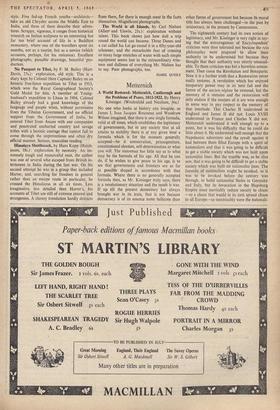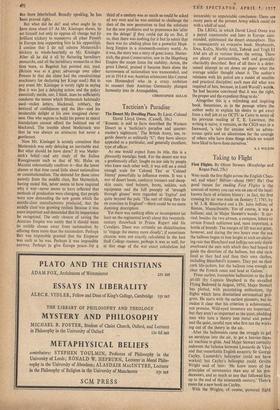Metternich
A World Restored: Metternich, Castlereagh and the Problems of Peace, 1812-1822. By Henry Kissinger. (Weidenfeld and Nicolson, 36s.)
No one who looks at history can imagine, as James I, Jean Jacques Rousseau and Woodrow Wilson imagined, that there is one single formula, valid at all times, which establishes the legitimacy of governments, but in any society that at all attains to stability there is at any given time a formula which is for the moment generally accepted—be it consecration, primogeniture, constitutional election, self-determination or what you will. The statesman has little say as to what may be the formula of his age. All that he can do, if he wishes to give peace to his age, is to see that governments and frontiers are as far as possible shaped in accordance with that formula. Where there is no generally accepted formula then, as Mr. Kissinger truly says, there is a revolutionary situation and the result is war. If up till the present democracy has always brought war in its train, that is not because democracy is of its essence more bellicose than other forms of government but because Its moral title has always been challenged—in the past by aristocracy, in the present by Communism.
The eighteenth century had its own notion of legitimacy, and Mr. Kissinger is very right in say- ing that the extravagances of Encyclopedists' criticism were then tolerated not because the rois philosophes were prepared to allow their authority to be undermined but because they thought that their authority was utterly unassail- able. To them criticism was but a harmless amuse- ment. Then came the Revolution and Bonaparte. Now it is a further truth that a Restoration never really restores. A revolution which has enjoyed temporary power may in its turn fail and the forms of the ancien regime be restored, but the memory of it remains and the restoration will only endure if the masters of it are wise enough in some way to pay respect to the memory of that interlude. This Charles II understood in England and James II did not. Louis XVIII understood in France and Charles X did not. Metternich understood it well enough up to a point, but it was his difficulty that he could do little about it. He understood well enough that the Napoleonic adventure and the revolt against it had between them filled Europe with a spirit of nationalism and that it was going to be difficult to get a stable society which was not built upon nationalist lines. But the trouble was, as he also saw, that it was going to be difficult to get a stable society which was built on nationalist lines. 'The formula of nationalism might be invoked, as it was to be invoked before the century was through, to build nationalist States in Germany and Italy, but its invocation in the Hapsburg Empire must inevitably reduce society to chaos —to a chaos that would in its turn spread chaos to all Europe—so inextricably were the nationali- ties there intertwined. Broadly speaking, he has been proved right.
But what did he do? and what ought he to have done about it? As Mr. Kissinger shows, he Set himself not only to oppose all change but by brilliant trickery to manoeuvre all other Powets in Europe into supporting him In his opposition. I confess that I do not admire Metternich's trickery as whole-heartedly as Mr, Kissinger. After all he did it all by flattering hereditary monarchs, and all the hereditary monarchs at that time 'were, as Bagehot has pointed out, mad. (Britain was at a great advantage over other Powers In that she alone had the constitutional machinery for declaring her Kings mad.) But in any event Mr. Kissinger is surely right in saying that it was just a delaying action and the policy essentially sterile, nor, I think, does he sufficiently condemn the means which Matternich habitually used—stolen letters, blackmail, robbery, the betrayal of confidences and the like—and his intolerable delight at his own imagined clever- ness. One who aspires to build his power in moral foundations cannot afford the habitual use of blackmail. The trouble about Metternich was that he was always an aristocrat but never a gentleman.
Now Mr. Kissinger is acutely conscious that Metternich was only delaying an inevitable end. But what should he have done? It was Metter- nich's belief—and any study of the Italian Risorgimento such as that of Mr. Hales on Mazzini substantially confirms it—that the lower classes at that time cared little about nationalism or constitutionalism. The demand for these came entirely from the middle class, But Metternich, having stated this, never seems to have inquired why it was—never seems to have reflected that methods of production were changing, that people were now demanding the new goods which the middle-class manufacturers produced, that the middle class' was growing restless because it was more important and demanded that its importance
be recognised. The only chance of saving the Austrian Empire was surely that it should wean
its middle classes away from nationalism by offering them more than the nationalists. Perhaps that was impossible granted that the Emperor
was such as he was. Perhaps it was impossible anyway. Perhaps to give Europe peace- for ft third of a century was as much as could be asked of any man and he was entitled to challenge the Men of the new generation to find the solutions for the new problems and to pronounce his 'after me the deluge' if they could not do so. But, if so, then there was nothing for it but to admit that there was no abiding place for a powerful Haps- burg Empire in a nineteenth-century world. As it was, the story was a story of great irony. Metter- nich, the great Conservative, saw in the Hapsburg Empire the major force for stability. Acton, the great Liberal, praised it because there alone the narrowness of nationalism was transcended, and yet in 1914 it was Austrian aristocrats like Conrad von Hotzendorf who in a crazy ambition to reassert their Austrian Germanity plunged humanity into its Armageddon.
CHRISTOPHER HOLLIS













































 Previous page
Previous page